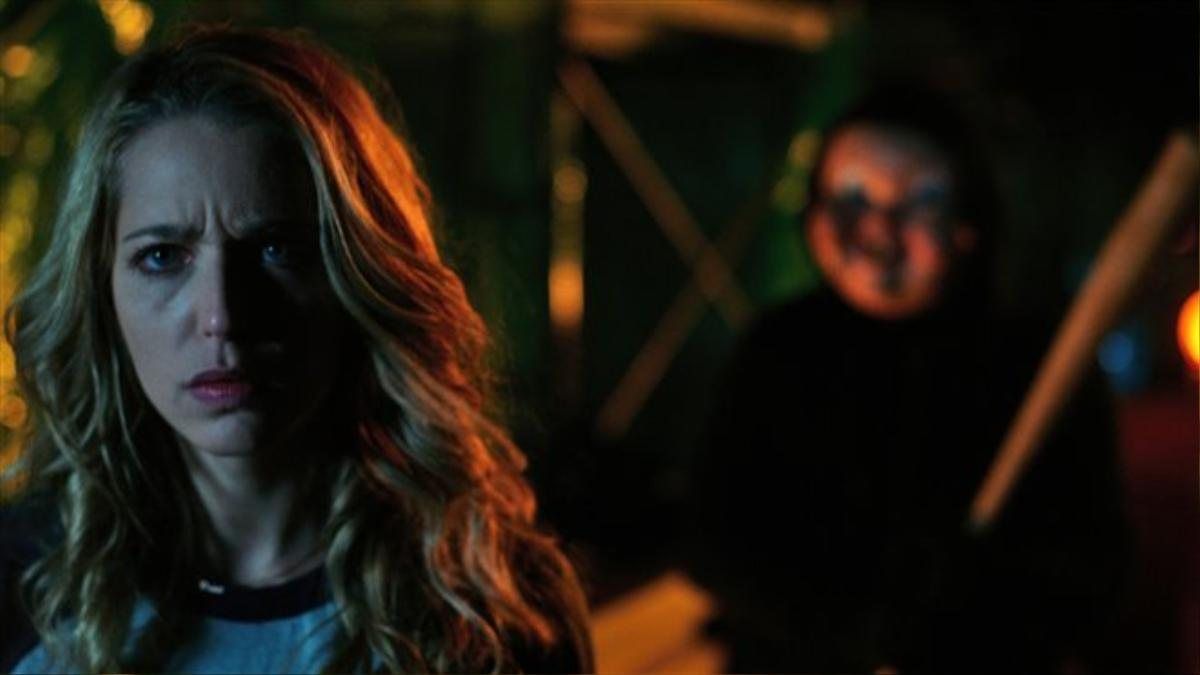Happy Death Day (2017)

“Happy Death Day” (2017), directed by Christopher Landon, is a unique entry into the horror genre that combines elements of slasher films with a clever twist on the time-loop trope. The film follows Tree Gelbman, a college student played by Jessica Rothe, who finds herself trapped in a repeating cycle of the day she is murdered. As she relives her death over and over, Tree must unravel the mystery of her killer and find a way to break the cycle before it’s too late. The film’s blend of horror, suspense, and dark humor, combined with its engaging protagonist and intriguing plot, makes it a standout in its genre.
The plot of “Happy Death Day” revolves around Tree Gelbman, a self-centered sorority girl who wakes up on her birthday only to be murdered by a masked killer. To her horror, Tree discovers that she is trapped in a time loop where she must relive the same day repeatedly, each time meeting her demise in a different manner. As the day resets, Tree experiences her death in various ways, ranging from violent attacks to lethal accidents. Each iteration of the day provides her with more clues about her assailant and allows her to explore different strategies to survive.

The structure of the film cleverly incorporates elements of both horror and comedy. The repetitive nature of the time loop allows for a mixture of suspenseful moments and darkly humorous scenarios, as Tree becomes increasingly frustrated and inventive in her attempts to escape her fate. The film balances these elements by juxtaposing intense, frightening sequences with lighter, comedic ones, showcasing Tree’s evolving character and the absurdity of her situation.
At the heart of “Happy Death Day” is Tree Gelbman, whose character undergoes significant development throughout the film. Initially, Tree is depicted as a typical college student who is more concerned with her social life and personal gains than with meaningful relationships or personal growth. Her superficial demeanor and the way she treats those around her set the stage for her transformation.

As Tree repeatedly experiences her murder, she begins to reflect on her life and her interactions with others. The time loop forces her to confront her own flaws and the consequences of her actions. Through her repeated encounters with the people in her life, including her roommate Lori (Ruby Modine), her love interest Carter (Israel Broussard), and her estranged father (Jason Bayle), Tree starts to understand the impact of her behavior on others. This introspection leads to a gradual shift in her character from a self-centered individual to someone who becomes more empathetic and self-aware.
Tree’s evolution is central to the film’s narrative and thematic depth. Her journey from being a passive victim to an active seeker of justice highlights themes of personal growth and redemption. The film effectively uses the time loop as a device to explore these themes, allowing Tree to learn from her mistakes and ultimately become a more grounded and compassionate person.

The identity of Tree’s killer and their motive are crucial to the film’s suspense and mystery. The killer’s repeated attacks and the clues left behind create an engaging whodunit aspect to the story. As Tree investigates her potential suspects, the film cleverly misleads the audience with red herrings and false leads, maintaining tension and intrigue throughout.
The eventual revelation of the killer’s identity and their motive is both surprising and fitting. The film’s twist not only resolves the central mystery but also ties into Tree’s personal growth and the themes of the story. The killer’s motivations are revealed to be rooted in personal grievances and unresolved issues, adding depth to the plot and providing a satisfying conclusion to the narrative arc.

“Happy Death Day” explores several themes beyond its surface-level horror elements. One of the central themes is the concept of personal transformation and the possibility of redemption. Tree’s journey through the time loop serves as a metaphor for self-reflection and growth. Her repeated experiences force her to confront her flaws and make amends with those she has wronged, ultimately leading to her redemption.
Another important theme is the value of life and the impact of one’s actions on others. As Tree relives her day, she gains a deeper appreciation for her life and the people around her. The film emphasizes the importance of kindness, empathy, and personal responsibility, highlighting how individual actions can affect the lives of others.
The visual style of “Happy Death Day” contributes significantly to its overall atmosphere. The film utilizes a combination of suspenseful cinematography and clever editing to enhance the horror and tension of the time loop. The repeated sequences of Tree’s death are depicted with varying degrees of intensity, adding to the film’s sense of unpredictability and danger.

The film also employs a vibrant color palette and energetic soundtrack that reflect the college setting and contribute to its dynamic tone. The blend of horror and humor is visually represented through the use of contrasting colors and music, creating a unique cinematic experience that sets the film apart from traditional horror movies.
“Happy Death Day” (2017) is a fresh and inventive take on the horror genre, blending elements of slasher films with the time-loop narrative to create an engaging and thought-provoking story. Through its complex protagonist, suspenseful plot, and thematic depth, the film offers more than just scares, providing a meaningful exploration of personal growth and redemption. Jessica Rothe’s performance as Tree Gelbman is central to the film’s success, bringing both depth and relatability to the character. “Happy Death Day” stands out as a compelling and entertaining film that combines horror, humor, and heartfelt moments in a way that resonates with audiences and sets a new standard for genre innovation.











